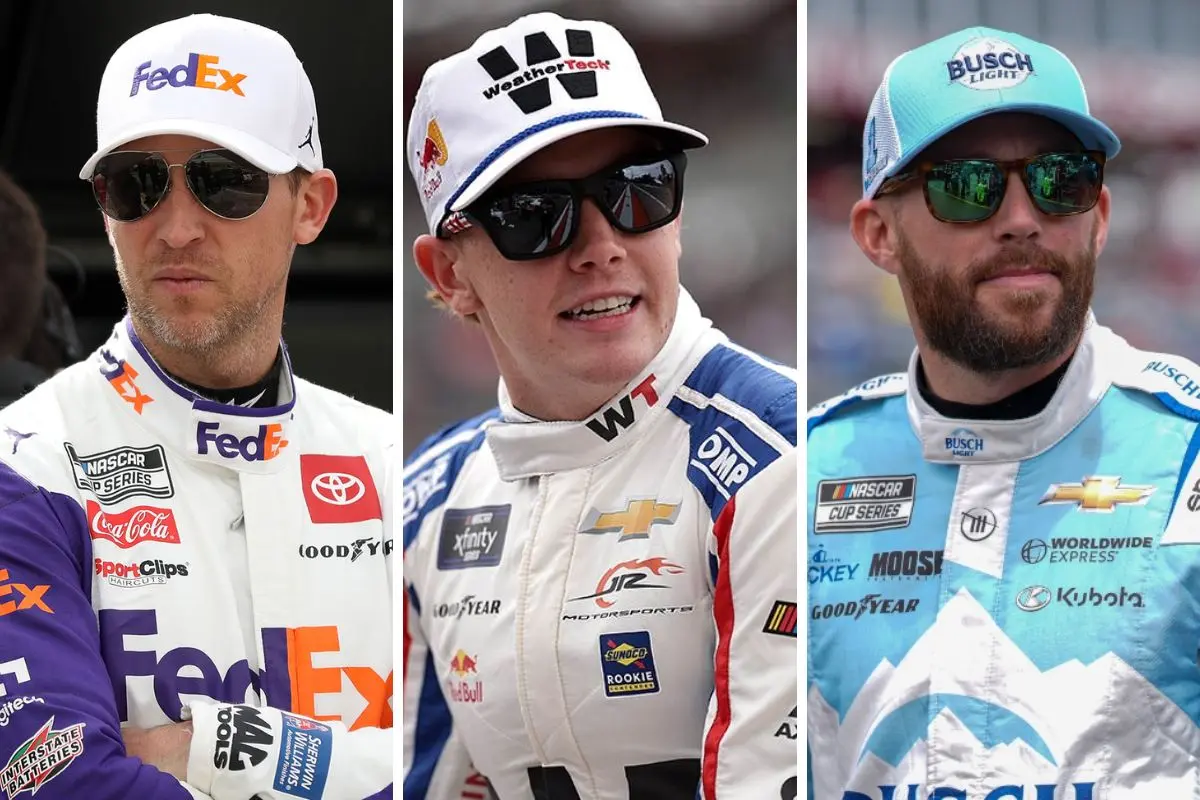Denny Hamlin‘s criticism of NASCAR’s double standard highlights an important issue in the sport’s rule enforcement. The contrasting outcomes for Zilisch and Chastain raise questions about fairness and consistency. While Zilisch’s tactic went unpunished, Chastain faced a heavy penalty for a similar act. This inconsistency could undermine the sport’s credibility. The situation prompts a deeper exploration of how NASCAR applies its rules and the implications for competitive integrity.
Key Highlights
- Denny Hamlin criticized NASCAR’s inconsistency in penalizing drivers for similar track maneuvers.
- Hamlin highlighted disparities between Zilisch’s unpenalized win and Chastain’s penalized third-place finish.
- NASCAR’s inconsistent rule enforcement affects driver strategy and sport integrity.
- The Portland incident underscores the need for clearer race boundary guidelines.
- Hamlin’s comments reflect broader concerns about fairness and consistency in NASCAR’s decision-making.
Why Did NASCAR Let Connor Zilisch Keep His Controversial Win?
How does NASCAR justify allowing Connor Zilisch to keep his win despite the apparent breach of track limits?
NASCAR’s decision hinges on the unique layout at Portland International Speedway, where an alternate route outside turn one is designed as a self-penalizing measure. This provision theoretically slows drivers who deviate from the main track, thereby maintaining fairness.
However, Zilisch’s tactic during the final restart defied this intention, as he gained an advantage by avoiding congestion and rejoining the race with a considerable lead.
NASCAR’s rulebook supports the absence of a penalty in this scenario, yet it raises questions about the consistency of enforcement.
The situation highlights the complexities and potential pitfalls in rule applications, challenging the sport’s integrity and regulatory framework.

How Does Ross Chastain’s 2022 Penalty Compare to Zilisch’s Situation?
In examining the parallels between Ross Chastain’s 2022 penalty at the Indianapolis road course and Connor Zilisch’s situation, one might wonder how NASCAR’s regulatory consistency holds up under scrutiny.
“I guess the argument is that, and I can’t remember the whole Ross Chastain thing, but I have seen it on social media. When he did it at Indy, NASCAR penalized him. And I think by the letter of the law, he did it correctly.” – Denny Hamlin
Both drivers opted for an alternative route to avoid on-track chaos, with Chastain at Indianapolis and Zilisch in Portland. Chastain’s decision to bypass turn one using an access road led him to finish in third place; however, NASCAR imposed a penalty, reflecting a firm stance against such tactics.
“But he did the same thing. Screw this. I ain’t taking turn one and getting wrecked in all the bottleneck and getting damaged. I’m just going dead straight. I’m going to take this alternative route and wherever I come out, I come out.” – Denny Hamlin

In contrast, Zilisch’s similar choice at Portland did not result in a penalty, prompting questions about equitable enforcement of rules.
This disparity raises critical discussions on NASCAR’s interpretative flexibility and decision-making consistency, challenging its credibility in uniformly applying regulations.
NASCAR’s Harsh Penalty for Chastain and Dillon
Although the availability of alternative routes might suggest flexibility in on-track decision-making, NASCAR’s punitive response to Ross Chastain and Austin Dillon’s actions at the Indianapolis road course highlights a commitment to traditional race boundaries.
Despite the mechanical availability of access roads, NASCAR’s severe penalties—dropping Chastain from second to 27th and likewise penalizing Dillon—underscored an unyielding stance against shortcuts.
This enforcement reflects an underlying ethos of preserving the integrity and challenge of the racecourse itself, ensuring that drivers adhere to the established path.
By implementing such stringent penalties, NASCAR communicates a clear deterrent against exploiting unconventional routes.
The incident serves as a clear reminder of the importance NASCAR places on maintaining the sanctity of competitive racing norms.

What Makes NASCAR’s Inconsistent Enforcement So Problematic?
Despite NASCAR’s efforts to maintain racing integrity, the inconsistent enforcement of rules presents considerable challenges for competitors.
Ross Chastain’s experience at Indianapolis highlights the confusion drivers face. His decision to utilize an access lane, assuming it was a legitimate option to avoid collisions, emphasizes the ambiguity in rule interpretation.
This situation exemplifies how mixed messaging can lead to misunderstandings about what constitutes a legal maneuver. When alternative routes are visibly marked, drivers are likely to perceive them as permissible, especially in high-pressure situations.
NASCAR’s inconsistent application of rules creates uncertainty, which not only affects driver strategy but also diminishes fairness. For a sport that thrives on precision, the lack of clarity in rule enforcement is detrimental to its competitive ethos.
The Bigger Issue NASCAR Now Faces
As NASCAR grapples with the implications of inconsistent rule enforcement, the issue extends beyond mere competitive fairness to the integrity of the sport itself. The Portland incident highlights a crucial flaw in the chicane system, designed to penalize but inadvertently rewarding Zilisch’s strategy.
This inconsistency challenges NASCAR’s credibility, as drivers like Zilisch exploit rules while Chastain faces harsh penalties. Such disparities leave the community questioning future rulings.
Clarity in rule enforcement is vital. Without it, NASCAR risks alienating its stakeholders.
 Circuit of The Americas‘ Major Overhaul” width=”1200″ height=”800″ srcset=”https://slicksandsticks.com/wp-content/uploads/2025/02/NASCARs-Big-Shake-Up.webp 1200w, https://slicksandsticks.com/wp-content/uploads/2025/02/NASCARs-Big-Shake-Up-300×200.webp 300w, https://slicksandsticks.com/wp-content/uploads/2025/02/NASCARs-Big-Shake-Up-1024×683.webp 1024w, https://slicksandsticks.com/wp-content/uploads/2025/02/NASCARs-Big-Shake-Up-768×512.webp 768w, https://slicksandsticks.com/wp-content/uploads/2025/02/NASCARs-Big-Shake-Up-630×420.webp 630w, https://slicksandsticks.com/wp-content/uploads/2025/02/NASCARs-Big-Shake-Up-150×100.webp 150w, https://slicksandsticks.com/wp-content/uploads/2025/02/NASCARs-Big-Shake-Up-696×464.webp 696w, https://slicksandsticks.com/wp-content/uploads/2025/02/NASCARs-Big-Shake-Up-1068×712.webp 1068w” sizes=”auto, (max-width: 1200px) 100vw, 1200px” />
Circuit of The Americas‘ Major Overhaul” width=”1200″ height=”800″ srcset=”https://slicksandsticks.com/wp-content/uploads/2025/02/NASCARs-Big-Shake-Up.webp 1200w, https://slicksandsticks.com/wp-content/uploads/2025/02/NASCARs-Big-Shake-Up-300×200.webp 300w, https://slicksandsticks.com/wp-content/uploads/2025/02/NASCARs-Big-Shake-Up-1024×683.webp 1024w, https://slicksandsticks.com/wp-content/uploads/2025/02/NASCARs-Big-Shake-Up-768×512.webp 768w, https://slicksandsticks.com/wp-content/uploads/2025/02/NASCARs-Big-Shake-Up-630×420.webp 630w, https://slicksandsticks.com/wp-content/uploads/2025/02/NASCARs-Big-Shake-Up-150×100.webp 150w, https://slicksandsticks.com/wp-content/uploads/2025/02/NASCARs-Big-Shake-Up-696×464.webp 696w, https://slicksandsticks.com/wp-content/uploads/2025/02/NASCARs-Big-Shake-Up-1068×712.webp 1068w” sizes=”auto, (max-width: 1200px) 100vw, 1200px” />
News in Brief: Denny Hamlin Slams NASCAR Double Standard Over Zilisch & Chastain
The contrasting penalties between Zilisch and Chastain highlight a problematic inconsistency in NASCAR’s rule enforcement. While Zilisch’s actions went unpunished, Chastain faced severe consequences for a similar tactic, raising questions about the fairness and clarity of NASCAR’s regulations. This perceived double standard not only frustrates drivers but also risks eroding trust in the sport’s governance. For NASCAR to maintain its integrity, it must guarantee consistent and transparent application of rules across all competitors.
ALSO READ: Denny Hamlin Fears What’s Next in NASCAR Lawsuit Drama!
